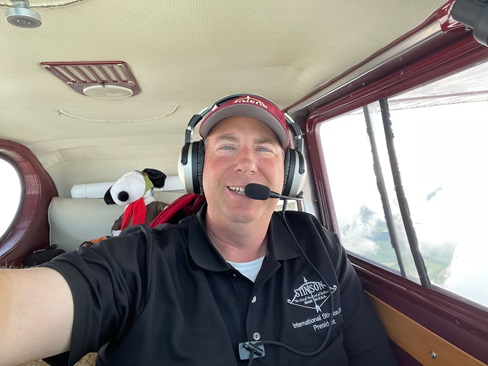FAA announces plan for new security-related airspace training
AOPA encourages focus on education not punishment
Congressman asks how much is enoughJust how much regulation is needed to protect the airspace around Washington, D.C., from the minute threat posed by an airplane that's smaller than a pickup truck? Hasn't the reaction begun to outweigh the risk?  Those are questions on the minds of GA pilots everywhere - and they're issues raised by Rep. Darrell Issa (R-Calif.) at Thursday's hearing before the House Committee on Government Reform. In his opening statement, Rep. Issa, an AOPA member, pilot, and strong GA supporter, urged his fellow lawmakers to remember the rich tradition and vital security contributions of GA in the United States. Issa pointed out that general aviation, recently vilified as a threat to national security, has been the training ground for the pilots who have defended the United States in every foreign war since the beginning of powered flight. Later in the hearing he asked just how much regulation is enough, considering the small threat posed by light GA aircraft. |
The airspace around Washington, D.C., is undeniably complex. Likewise pilots can face a "pop-up" temporary flight restriction (TFR) in any part of the country. But with recent incursions leading to the evacuation of the Capitol and White House, lawmakers are unwilling to settle for the status quo.
That's why AOPA has invested hundreds of hours in working with lawmakers to turn the focus of the discussion from onerous mandates and harsh punishments to education. Today, those efforts received a boost when the FAA announced a new training program to educate pilots nationwide about the Washington, D.C., Flight Restricted Zone (FRZ), Air Defense Identification Zone (ADIZ), and other security-related airspace restrictions.
 Rep. Jim Oberstar |
"It's not surprising that lawmakers are frustrated with airspace incursions that disrupt Congress and send staffers running for cover," said AOPA Phil Boyer. "But we've been working directly with key lawmakers, including congressional aviation security expert Rep. Jim Oberstar (D-Minn.) and AOPA member Rep. Robin Hayes (R-N.C.), to ensure that any response actually helps solve the problem by teaching pilots how to keep out of trouble instead of just penalizing them."
The FAA's proposed training program, announced during a security hearing before the House Committee on Government Reform, could do that while making legislation imposing such stiff penalties as $100,000 fines, airplane confiscation, and criminal prosecution unnecessary.
The proposal will require pilots to complete an FRZ/ADIZ and security TFR awareness training program, such as the AOPA Air Safety Foundation's "Know Before You Go" online course or an FAA safety seminar. Pilots would need to make a logbook endorsement and would receive a completion certificate that they'd be required to carry with them during flights into the national capital region. Pilots living within 100 miles of the ADIZ would have 30 days to comply, while pilots elsewhere would be given 120 days.
The training requirements will be detailed in a Special Federal Aviation Regulation (SFAR), though no timetable has yet been set for issuing such a rule.
In addition to the new training requirements, the FAA could increase civil penalties for violating the FRZ/ADIZ, raising the certificate suspension from 30 days to 120 days and revoking the certificates of repeat offenders.
"This kind of approach is far more reasonable than some of the reactionary proposals we've heard recently," Boyer said. "It just makes sense to educate pilots so they can avoid making a mistake. Tough penalties without education won't solve anything, but they will turn otherwise law-abiding citizens into criminals, strangle general aviation, and cause serious economic harm to communities around the nation's capital and possibly across the country."
But the FAA's announcement may not be enough to preempt other security legislation focusing on GA in the national capital area. AOPA will continue to work with lawmakers in both houses of Congress to protect the balance between security and freedom for GA pilots.
July 21, 2005

